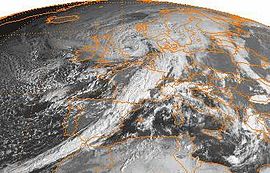1987 storm
| The Great Storm of 1987 | |
|---|---|
| Data | |
| Formed: | 15 October 1987 |
| Dissipated: | 16 October 1987 |
| Lowest pressure: | 953 mbar (hPa) |
| Highest winds: | 216 km/h (134 mph) |
| Countries affected: | |
| Fatalities: | 22 |
| Damage: |
UK: £2 billion (£5.163 billion today) France: 23 billion francs (£7.150 billion today) |
The Great Storm of 1987 was a violent extratropical cyclone that occurred on the night of 15–16 October, with hurricane-force winds causing casualties in England, France and the Channel Islands as a severe depression in the Bay of Biscay moved northeast. Among the most damaged areas were Greater London, the East Anglian coast, the Home Counties, the west of Brittany and the Cotentin Peninsula of Normandy which weathered gusts typically with a return period of 1 in 200 years.
Forests, parks, roads and railways were strewn with fallen trees as well as schools being closed. The British National Grid suffered heavy damage, leaving thousands without power. At least 22 people were killed in England and France. The highest measured gust of 117 kn (217 km/h; 135 mph) was recorded at Pointe Du Roc, Granville, France and the highest gust in the UK of 100 kn (190 km/h; 120 mph) was recorded at Shoreham-by-Sea.
That day's weather reports had failed to indicate a storm of such severity, an earlier, correct forecast having been negated by later projections. The apparent suggestion by the BBC's Michael Fish of a false alarm is celebrated as a classic gaffe, though he claims he was misquoted. The storm has been termed a weather bomb due to its rapid development.
Major improvements were later implemented in atmospheric observation, relevant computer models, and the training of forecasters.
On the Sunday before the storm struck, the farmers' forecast had predicted bad weather on the following Thursday or Friday, 15–16 October. By midweek, however, guidance from weather prediction models was somewhat equivocal. Instead of stormy weather over a considerable part of the UK, the models suggested that severe weather would reach no farther north than the English Channel and coastal parts of southern England.
...
Wikipedia

